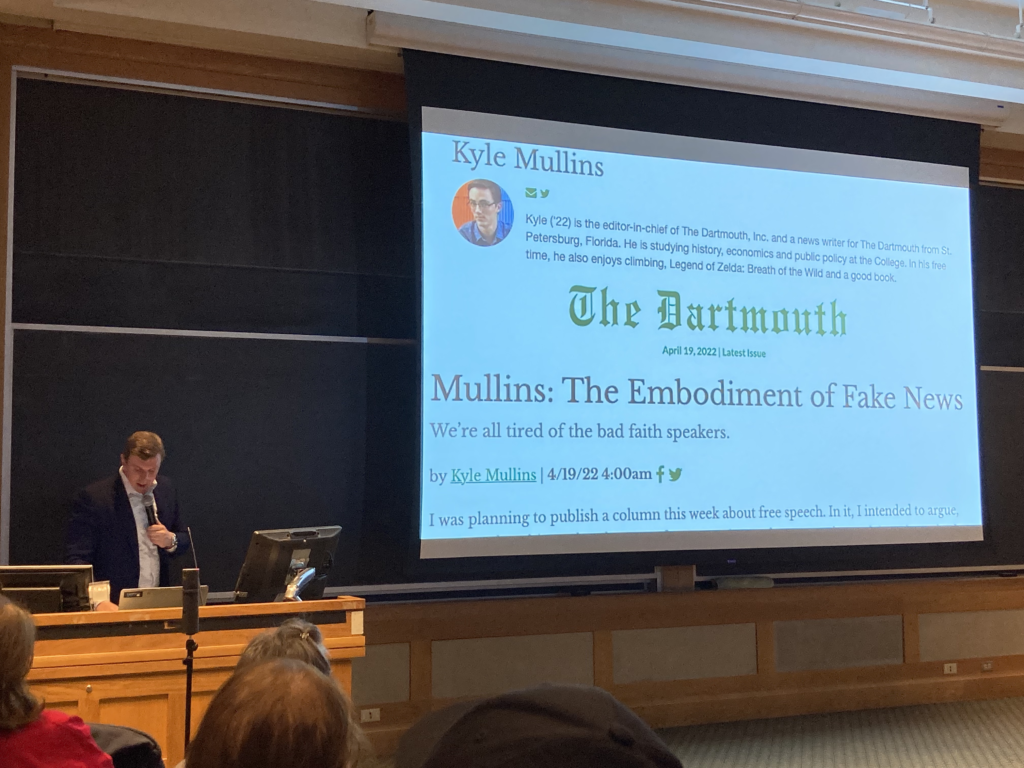
What comes to mind when you hear the word veritas? Some Dartmouth students might recall the Latin word as the motto of a school in Cambridge from which they were rejected. Last Wednesday, however, the word appeared in a different form, as the Dartmouth College Republicans invited investigative journalist and Project Veritas founder James O’Keefe to campus. The in-person event was particularly notable given the unfairness surrounding the CRs’ previous event with conservative journalist Andy Ngo. Hours before that event, the College abruptly ordered the speech to be delivered virtually due to “safety concerns” and blamed the CRs for inadequate preparation. Subsequent investigation from FIRE, a nonpartisan civil liberties group, revealed several flaws in Dartmouth’s cancellation rationale and suggested that the CRs’ First Amendment protections were violated. After this debacle from the past winter, all eyes were on this event.
For over a decade, Project Veritas has been a fixture in conservative media. The organization consists of undercover operatives who secretly record individuals and staff from major organizations—such as ACORN, Planned Parenthood, CNN, and The New York Times—to reveal malpractice. Conservatives laud the organization for its exposés on topics including media bias, voter fraud, and teachers-union corruption. Opponents of Project Veritas, however, accuse the group of deceptive video editing, entrapment, and disinformation. Given such conflicting attitudes, The Review was excited to hear directly from the organization’s founder.
The event in Filene Auditorium began with an introduction from College Republicans President Chloe Ezzo ’22, in which she sharply criticized the former editor-in-chief of The Dartmouth, Kyle Mullins, for publishing an op-ed that rebuked James O’Keefe’s visit to campus. She concluded her remarks with a message to “Bring on the fake news,” as she welcomed O’Keefe to the front.
O’Keefe also commenced his speech by condemning Mullins’ op-ed, which would become frequently referenced throughout the presentation. After being labeled “unserious” by Mullins, O’Keefe was determined to demonstrate the validity of his work and organization. Therefore, the presentation largely consisted of O’Keefe playing clips of notable Project Veritas stories and providing commentary in between.
O’Keefe first played noteworthy ‘hot mic’ footage released by Project Veritas in 2019, which showed ABC News reporter Amy Robach lamenting the fact that the network quashed her story on billionaire Jeffrey Epstein’s notorious sex trafficking ring in 2015. Next, he showed footage of a NJ teachers union leader assuring a Project Veritas journalist that one teacher would not be reprimanded for striking a student and that another teacher faced no criminal penalties for having sex with a teenage girl. An additional video depicted a Texas woman—now facing felony charges—expressing willingness to collect votes for cash. Attention was also devoted to clips revealing Project Veritas’ work in uncovering media bias. One clip demonstrated CNN Technical Director Charlie Chester discussing the network’s efforts to thwart President Trump’s re-election bid and claiming that “fear drives numbers,” in reference to COVID coverage.
Between clips, O’Keefe provided commentary and circled back to question why Mullins would perceive the Project Veritas content to be “unserious.” While O’Keefe certainly had the right to express his discontent about the article, a few minutes at the beginning of the event would have sufficed. The constant jabs at Mullins simply became tiresome and ultimately detracted from the important content being displayed. Mullins issued a lengthy statement to The Dartmouth, in which he denounced O’Keefe’s “efforts to undermine trust in the free press [that] are damaging to democracy and free speech.” Given the mainstream media’s abject failure to appropriately cover countless major news stories, The Review does not endorse that statement, even if we were less than enthused by the unnecessary targeting at the event.
Throughout his speech, O’Keefe expressed concern over the current state of journalism, labeling it a “hall-monitoring exercise of censorship.” He specifically lamented that, today, journalistic inaccuracy is not only condoned but rewarded in the form of Pulitzer Prizes—likely in reference to The New York Times’ and The Washington Post’s joint award for their “Russiagate” coverage.
Typically, CR event Q&As are quite contentious, as students—who are largely not conservative—directly challenge the speaker. However, this was not the case for the James O’Keefe event. While Filene Auditorium was quite full, only about a fifth of the attendees were students; the remainder appeared to be locals, who were by and large Republicans and supportive of O’Keefe’s work. The Q&A saw questions on the topics of privacy, decentralized journalism, and how to discern the truth amidst unprecedented polarization and bias.
The Review briefly spoke with O’Keefe after the event. He indicated satisfaction with the event and said that it was “well received.” However, he also expressed that he was hoping to have “more haters come [to] give [him] a hard time.” Seven Sassano ’22, who attended the discussion, said she would have wished for “more students [to have asked] questions.”
Nonetheless, the event was well organized, and operations were smooth. Ultimately, when not ranting about Kyle Mullins, James O’Keefe’s words were quite non-controversial. His commentary notably lacked partisan overture, and his message implored audience members to read between narratives to find truth. Perhaps the best part of the event, however, was the free Project Veritas merchandise—The Review went home with a lovely stuffed alpaca and a “New York Lies” hat, which will make great additions to our office.

Nice to see a balanced well written review.